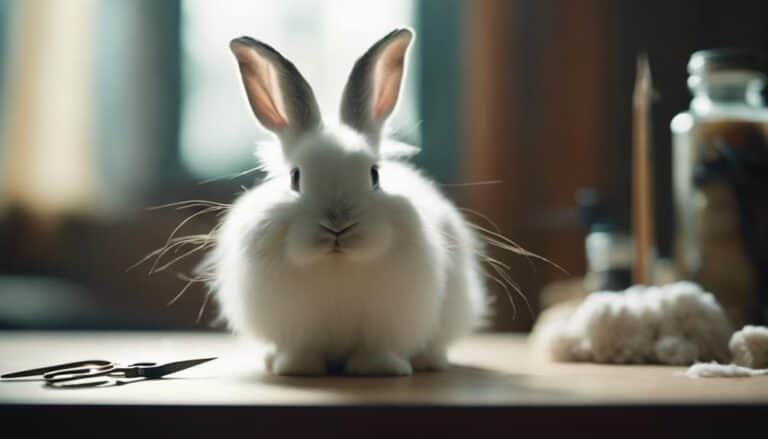Imagine the intricate web of considerations when contemplating whether bunnies can wear collars. The safety and comfort of your fluffy companion are paramount, and the decision is critical.
It is not recommended to put collars on bunnies as they can easily injure themselves trying to remove them. Collars can get caught on something in their environment, causing strangulation or injury. If you want to identify your rabbit, consider other methods such as tags or microchips.
While the idea of adorning your bunny with a cute accessory might be tempting, there are numerous factors to weigh. From potential risks to safer alternatives, the discussion surrounding bunnies and collars delves into a domain that requires careful thought and consideration.
Contents
- 1 Key Takeaways
- 2 Pros of Collars for Bunnies
- 3 Cons of Collars for Bunnies
- 4 Safety Considerations for Collars
- 5 Alternative Identification Methods
- 6 Breakaway Collars for Bunnies
- 7 Suitable Harness Options for Bunnies
- 8 Walking Your Bunny Safely
- 9 Final Thoughts on Collars for Bunnies
- 10 Frequently Asked Questions
- 11 Is It Safe to Groom a Bunny While Wearing a Collar?
- 12 Conclusion
Key Takeaways
- Collars can be risky for bunnies due to potential injuries and discomfort.
- Microchipping is a safer identification alternative to collars.
- Breakaway collars pose safety concerns for delicate rabbit necks.
- Harnesses offer a safer option for walking bunnies than collars.
Pros of Collars for Bunnies
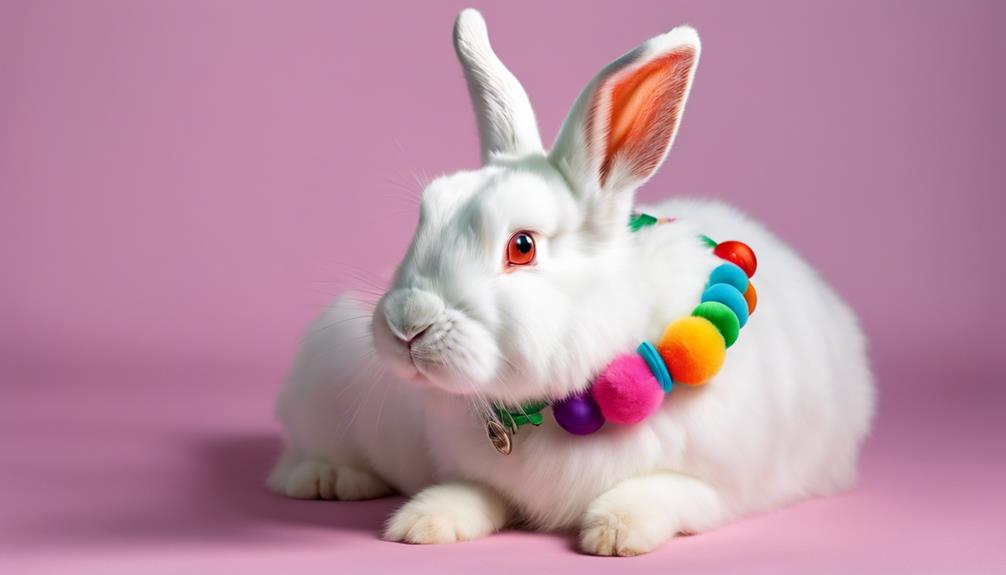
Wearing collars can provide numerous benefits for your rabbit, making them a practical and stylish accessory for your pet. Collars serve as a form of identification, especially when personalized with tags containing contact information. In the unfortunate event that your bunny wanders off, a collar can help in ensuring a safe return. Additionally, decorative collars can add a cute and fashionable element to your rabbit’s appearance, allowing them to stand out in a crowd.
Some bunnies may tolerate wearing collars well, which can be advantageous during training sessions or when introducing them to new environments. Collars can also be a temporary accessory for bunnies in controlled indoor settings, offering a way to differentiate between multiple pets or simply to add a touch of charm to their everyday look. Overall, collars can be a practical and beneficial addition to your rabbit’s wardrobe, enhancing both their style and safety.
Cons of Collars for Bunnies
When considering the use of collars for bunnies, it’s important to be mindful of the potential drawbacks associated with this accessory.
Collars can be dangerous for rabbits as they’ve delicate necks that are susceptible to injury. If a rabbit tries to remove the collar, the sensitive skin around its neck may get injured, leading to neck injury or potentially breaking. Additionally, if the collar snags on something while the rabbit is moving around, it can cause the rabbit to panic and injure itself.
Additionally, collars can wear away fur and cause abrasions on a rabbit’s neck, resulting in discomfort for the animal. Given that rabbits are easily startled creatures, wearing collars can be risky as sudden movements may lead to accidents.
In general, it’s advised to avoid using collars on rabbits due to the various risks they pose to the well-being of these gentle animals.
Safety Considerations for Collars
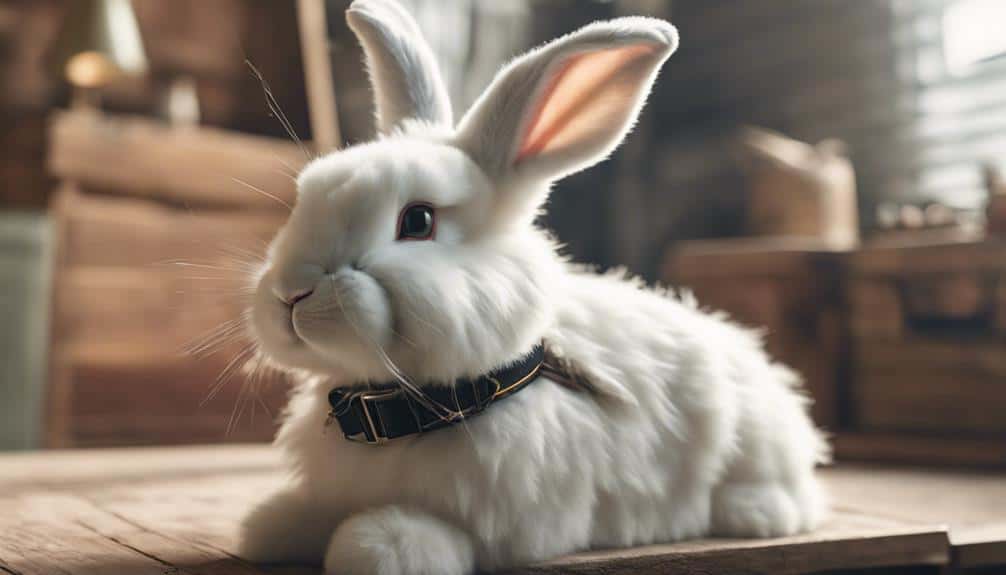
When considering collars for your bunny, it’s important to focus on safety considerations to prevent potential harm.
Points such as collar size for bunnies, breakaway collar features, and collar material safety are essential aspects to keep in mind.
Collar Size for Bunnies
To maintain the safety and comfort of your bunny, choosing a collar size that allows for two fingers to fit snugly between the collar and your pet’s neck is essential. Proper collar sizing for rabbits is critical to prevent any risks of neck injury. Collars should be lightweight, adjustable, and not too tight around the neck.
Avoid using heavy bells, charms, or tags that could cause discomfort. Opt for breakaway collars designed specifically for rabbits to prevent choking hazards if your bunny gets caught on something. Regularly check and adjust the collar size as your bunny grows to guarantee a proper fit.
Breakaway Collar Features
Breakaway collars offer a safety feature designed to release under pressure, preventing potential choking or injury to the pet. For rabbits, whose necks and spines are very fragile, the danger of strangulation is a significant concern.
While breakaway collars are commonly used for cats, they may not be suitable for rabbits due to their strength and behaviors. The snap-open feature, meant for safety, can pose a risk of the rabbit escaping and getting lost. Rabbits’ strong movements may also cause unintended collar release.
Collar Material Safety
For best safety and comfort, choose a collar material that’s soft, lightweight, and essential for your bunny’s delicate neck. Opt for materials that won’t cause skin irritation, such as nylon, cotton, or soft leather.
Avoid collars with sharp edges, metal components, or excessive decorations that could harm your bunny. Adjustable collars are vital to guarantee a proper fit without being too tight or too loose, preventing choking hazards or potential escapes.
Breakaway collars, specifically designed for small animals, are critical to minimize the risk of strangulation if your bunny gets caught on something. Reflective or brightly colored collars can enhance visibility, especially for outdoor bunnies, reducing the chances of accidents or loss.
Alternative Identification Methods
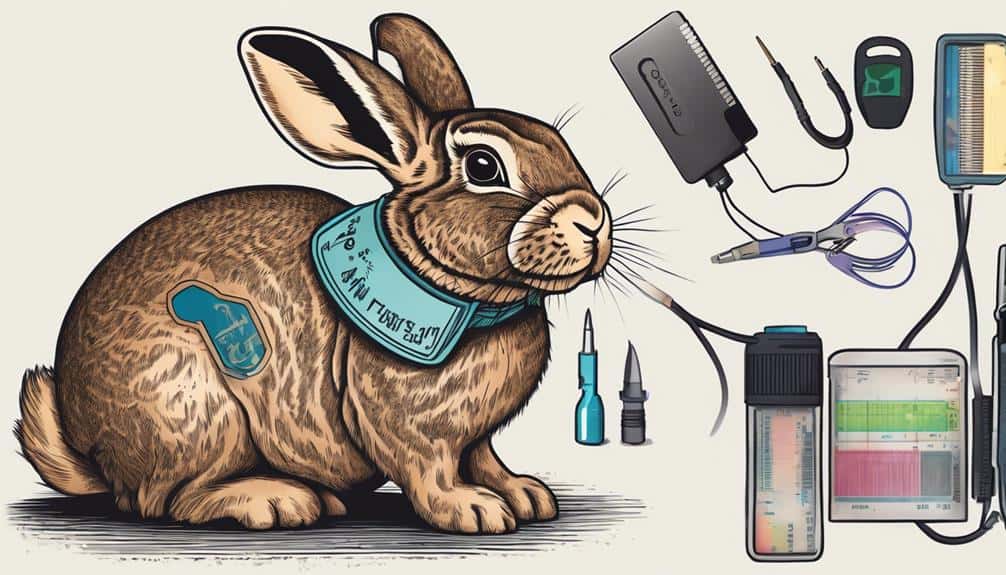
When considering alternative identification methods for rabbits, microchipping by a vet between the shoulder blades emerges as a safer and more effective option. Microchips provide a secure form of identification as they contain owner information that can be easily accessed when scanned. This method is preferred over collars, which pose a risk of neck injury to rabbits.
Although the cost of microchipping is comparable to high-quality collars, it offers a more reliable solution for identifying your rabbit if it gets lost. By opting for microchipping, you make certain that your rabbit can be safely identified without the potential dangers associated with collars. This method not only serves as a means of identification but also prioritizes the well-being and safety of your furry companion.
Hence, when it comes to ensuring your rabbit’s safety and security, choosing a vet to microchip your rabbit is a wise decision.
Breakaway Collars for Bunnies
When considering breakaway collars for your bunny, it’s important to prioritize safety and choose a collar that can withstand your pet’s strength. Additionally, make sure the collar is appropriately sized to prevent any potential hazards or discomfort for your rabbit.
Understanding the limitations and risks associated with breakaway collars is vital in keeping your bunny safe and secure.
Safety of Breakaways
Considering the strength and behavior of rabbits, breakaway collars may pose safety risks as they can unexpectedly snap open and potentially lead to runaway situations. Rabbits have delicate necks and bodies, so the danger of a breakaway collar accidentally opening and allowing the rabbit to escape or causing harm is significant. If a rabbit were to escape somehow, the consequences could be severe, including the risk of breaking their neck or back.
Additionally, there’s a concern about the collar getting caught on something and potentially choking the rabbit or causing injury. Due to these reasons, using breakaway collars not specifically designed for rabbits may not be the safest choice for their well-being and security.
Collar Size for Bunnies
To guarantee the safety and comfort of your bunny, selecting the appropriate collar size is essential when using breakaway collars designed for rabbits. Breakaway collars for pet rabbits should be lightweight and adjustable, ensuring a snug but not too tight fit to prevent discomfort or injury.
These collars are specifically designed to release under pressure, preventing choking or strangulation. When fitting a collar on your rabbit, make sure there’s enough room for two fingers to fit between the collar and your bunny’s neck for a safe and comfortable fit.
Regularly checking and adjusting the collar size as your pet rabbit grows is vital to maintain a proper fit. Being attentive to the collar size shows you’re concerned about your rabbit’s well-being, considering how fragile they can be.
Suitable Harness Options for Bunnies
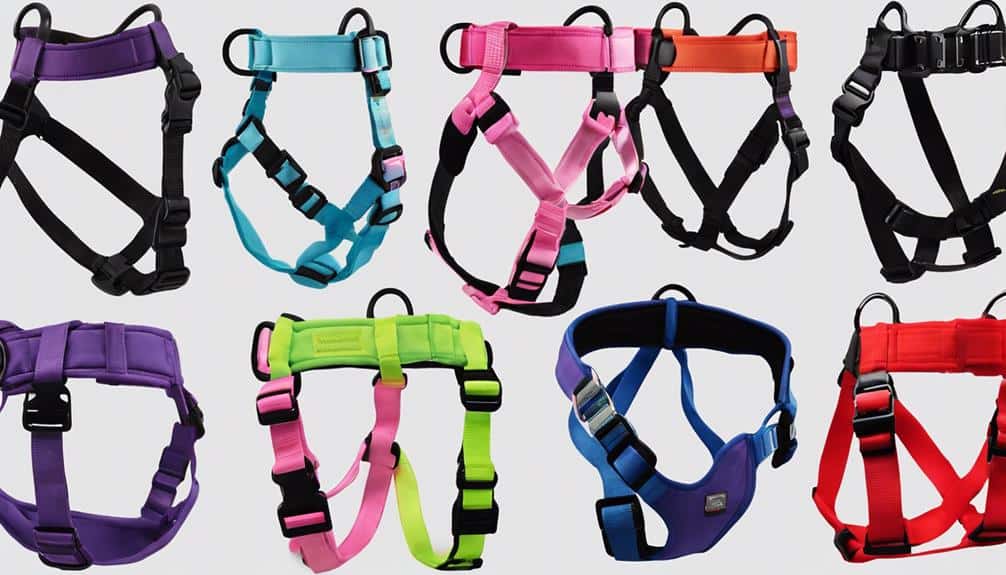
For best comfort and safety during outdoor activities, selecting a suitable harness for your bunny is essential. When considering suitable harness options for your bunny, the following choices are recommended:
- H-Harness: This harness is designed to reduce strain on your bunny’s delicate neck, making it a good choice for walks. The H-shape distributes pressure more evenly across the chest.
- Vest or Coat Harness: These options cover more of your bunny’s body, providing additional support and security. They’re particularly suitable for bunnies who may be more skittish during outdoor adventures.
- Secure Fastenings: Opt for harnesses with secure fastenings to prevent any accidental escapes. Double-check the buckles and clasps to ensure they’re sturdy and reliable.
- Proper Fit: Avoid harnesses that are too tight or too loose. A proper fit is essential for your bunny’s comfort and safety. Be sure to adjust the harness to fit snugly without causing any discomfort.
Walking Your Bunny Safely
When taking your bunny for a walk, it’s important to prioritize their safety by using a properly fitted harness instead of a collar to prevent neck injuries and choking hazards. Rabbit owners should put a collar on their bunny only for identification purposes at home, never for walks.
Make sure the harness fits snugly but comfortably on your bunny to prevent escape and discomfort during walks. Supervising your bunny closely while they’re on a harness is essential to prevent potential accidents or injuries outdoors. It’s advisable to introduce the harness gradually indoors before taking your bunny outside to get them accustomed to wearing it.
Final Thoughts on Collars for Bunnies
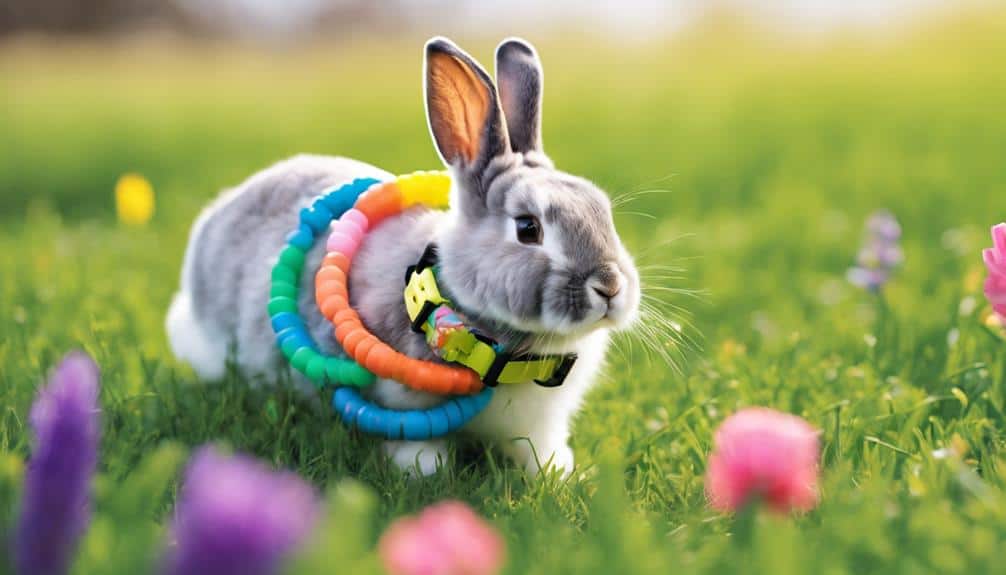
In considering the use of collars for bunnies, it’s essential to prioritize their safety and well-being above all else. Placing a collar on your rabbit may seem like a good idea for identification, but it can pose several risks to your furry friend. Here are a number of reasons why collars aren’t suitable for rabbits:
- Delicate Neck: A collar around a rabbit’s neck can potentially cause harm due to their delicate neck structure.
- Sensitive Skin: The sensitive skin of a rabbit’s body can easily be injured by the material of the collar.
- Risk of Injury: Collars can lead to injuries such as strangulation or discomfort when not fitted correctly.
- Escape Concerns: If a collar isn’t secure, your bunny may be able to break free and run away, putting them in danger.
Given these considerations, opting for safer methods like microchipping is advisable to guarantee your rabbit’s safety and prevent any potential harm.
Frequently Asked Questions
Is It Safe to Put a Rabbit on a Leash?
When walking your rabbit, using a snug harness is safer than a collar. Leash training with back-connected leashes and proper fit guarantees safety. Avoid risks like strangulation and neck injury by opting for a harness, offering enrichment and exercise opportunities.
Can a Bunny Wear a Dog Harness?
When considering a bunny harness for your rabbit, prioritize safety and comfort. Bunny harnesses are specifically designed for their unique anatomy, ensuring a secure fit and reducing the risk of injury. Proper sizing, training, materials, and comfort levels are key considerations.
What Should You Not Do With a Bunny?
When caring for a bunny, avoid disturbing sensitive areas, such as the belly, feet, and rear end. Confirm a healthy diet, safe housing, proper grooming, and ample exercise. Take steps to bunny-proof your home, prioritizing your pet’s safety and well-being.
Can Pet Rabbits Wear Clothes?
When it comes to pet rabbits, dressing them up in clothes, rabbit fashion, bunny accessories, pet rabbit outfits, or rabbit style isn’t necessary. Prioritize their comfort and natural behaviors over fashion statements that can cause stress and discomfort.
Is It Safe to Groom a Bunny While Wearing a Collar?
When it comes to safe grooming pet bunnies, it’s important to avoid wearing a collar while doing so. Collars can easily get caught on the bunny’s fur or skin, causing injury or distress. To ensure a safe grooming experience for your furry friend, it’s best to remove any potential hazards, including collars.
Conclusion
To summarize, when it comes to bunnies wearing collars, the risks far outweigh the benefits. Collars can lead to serious injuries and pose a threat to their safety.
Opting for safer alternatives like microchipping or harnesses is essential to guarantee your bunny’s well-being. Remember, the last thing you want is your fluffy friend getting tangled up in a dangerous situation.
Keep them safe and secure with the right identification method and gear.



